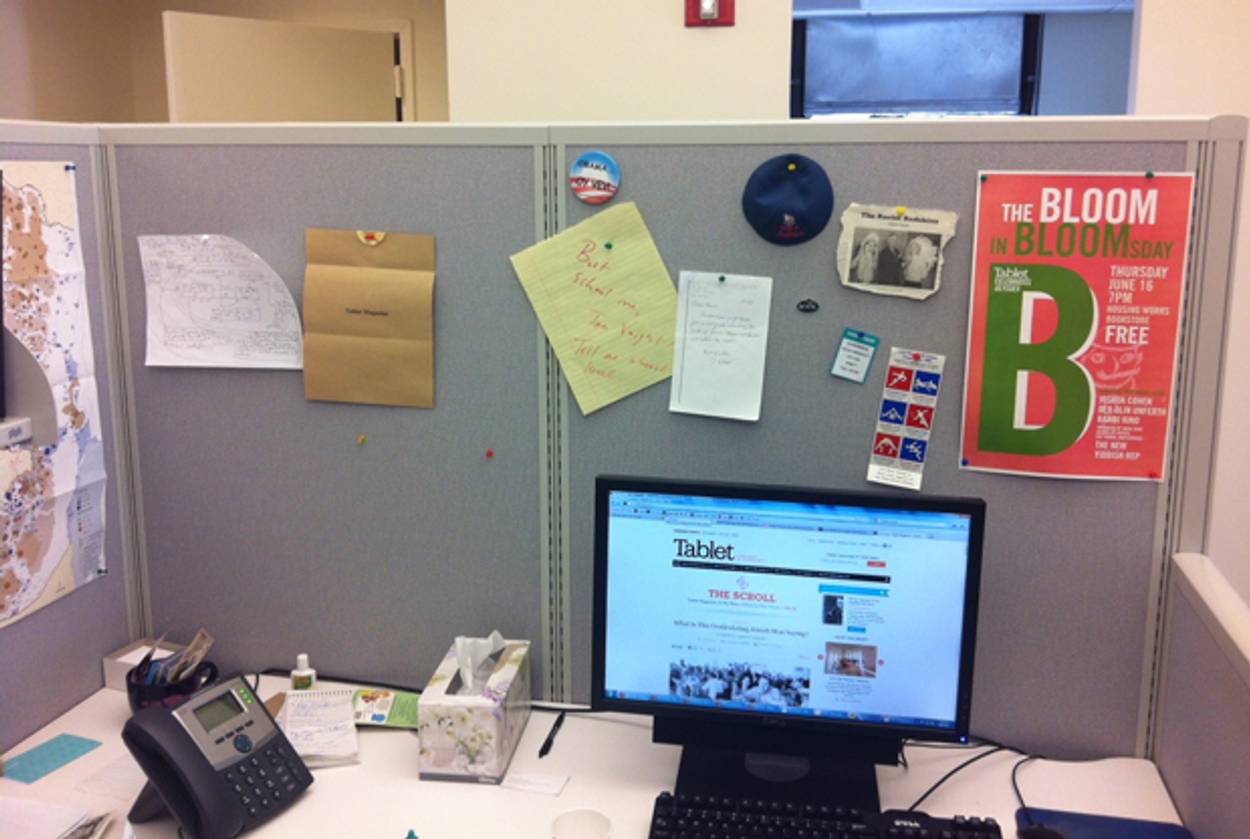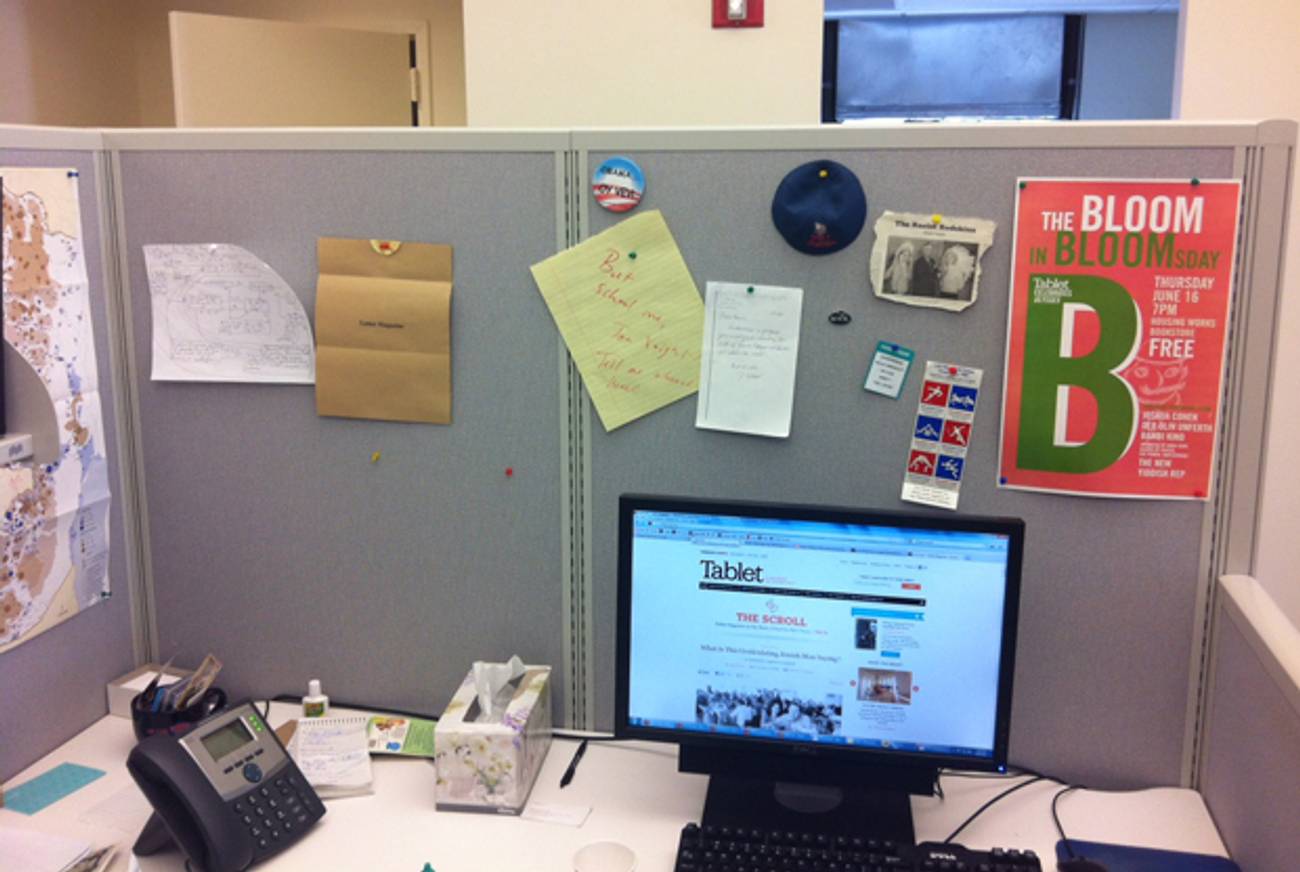My Jewish Education
In summing up, the moral seems a little bit obscure




So before things are handed over—this is my last day at Tablet Magazine; I start Monday as a staff writer at The New Republic, where I’ll write articles and, I’m sure, my share of blog posts, but for the first time in a really long time not *have* a blog—I want to say aloud what you’re no doubt thinking.
I’m a bit of a fraud.
Not a total fraud. Not—and here’s the crucial point—nearly as much of a fraud as I was on December 1, 2009, when I started as a Tablet Magazine staff writer in charge of The Scroll. But a little bit of one. I knew and know some stuff about some things, and some of those things were Jewish, and even more of those things are now. But I’ve really been winging it, learning on the go, teaching myself through blogging, through making mistakes, through getting lucky. For the first time in my over-educated existence, I was a complete autodidact—except I did it in public.
My model for this, some of you may be surprised (and some of you may be scandalized!) to know, is Andrew Sullivan, who from about 2001 to about 2005 had the best blog in the history of the Internet. He unapologetically used his writing to work things out for himself, and he sold readers on the premise that this would be interesting. That’s an extremely chutzpahdik thing to do, and it only worked because he had a unique way of thinking and writing about things, and readers were only too glad to come along for the ride. But it was his ride, subsidized, in effect, by his readers.
The Scroll was a bit more “service-y” than The Daily Dish—this was my job, and I usually had my readers somewhere in mind. But honestly, I probably averaged more than one post about sports per week. My Google Alerts included Mélanie Laurent, and generally there was an odd amount about France. I refused to post any Maccabeats YouTubes (go ahead, check). I wrote about politics in a way almost designed—and probably, subconsciously, actually designed—to ensure that nearly every reader better remembers the times he disagreed with me rather than the times that I said exactly what he was thinking. I wrote about fakarkte events in New York City. I ran interviews with people I like. In short, I did pretty much what I wanted.
What I wanted to do, and did do, is give myself an extremely rigorous two-and-a-half year course in what it means to be Jewish in America today. But this course was entirely subsidized by you (and by Tablet, on which more in a second; right now we’re talking about you). You let me pursue my idiosyncratic byways and weird obsessions. I hope to spend the rest of my life writing. But I don’t think I’ll ever have another job, or gig, or project, where I have one-fifth as much freedom to pursue whatever avenue of thought I feel like pursuing. And somehow, I also don’t think I’ll ever feel one-fifth as appreciated by my readers, who at Tablet have been impossible-to-miss presences, tremendously appreciative, incredibly generous, enthusiastic and exhortative, and apparently glad to be here. This is why my first thanks goes to you.
Hopefully you got something out of it—presumably you did, since you kept coming back. But in case you want a little more, here is my brief, trite, graduation-speech summary of what I learned during my extremely rigorous two-and-a-half year course in what it means to be Jewish in America today: we are the luckiest Jews in the history of Jews, and maybe the luckiest people in the history of people. The tradition and heritage that we have the privilege to claim and the freedom—political, financial, and social—that we have to inherit it and act on it would have been inconceivable to any group of Jews, or perhaps any group of people, during any other time in human history.
For me, the whole set-up has been entirely the product of luck, except for the extent to which I have elected—have, to use the appropriate word, chosen—to seize it. But the amount of luck that went into it makes me feel obliged to plead with you: please make the same decision I have. If you were born Jewish, or if you at some point decided you were a Jew, make the additional move and choose to be Jewish. Yes, it can be a burden; but it’s overwhelmingly a gift. Yes, people died for it; but much more importantly, everyone else, even if they don’t know it, would kill to have it. There’s nothing I’m more sure of than that.
***
I mean everything I said about feeling as though you have subsidized my education, but it does seem silly to speak entirely of non-economic subsidy in the context of a job, so thanks have to go, also, to Tablet. A part of me wants to explain to you how each and every staff member, past and present, has enabled The Scroll to exist, but I feel that’s between myself and each of them. There are three I’d like to single out here, however.
One of them, though, I’m not actually going to single out, because I think it would make this person uncomfortable. Suffice to say I very literally could not have done my job, every or any day, without this person.
The second is Jesse Oxfeld, who initially tracked me down and must have told someone he thought I would be good for Tablet. I’ll never forget that.
The final one is Alana Newhouse. Presumably it won’t for much longer, but right now, The Scroll proclaims that it is “Edited by Marc Tracy,” and while that’s true under an extremely narrow definition, under a more accurate one it has always been edited by Alana. An editor is not someone who can just edit copy. An editor uses all means at her disposal to coax the best out of volatile creative people who are incapable of harnessing their talent by themselves. Alana was the editor of The Scroll. I was its writer. And I’m going to miss it tremendously.
Earlier: Sundown, Daybreak
Marc Tracy is a staff writer at The New Republic, and was previously a staff writer at Tablet. He tweets @marcatracy.